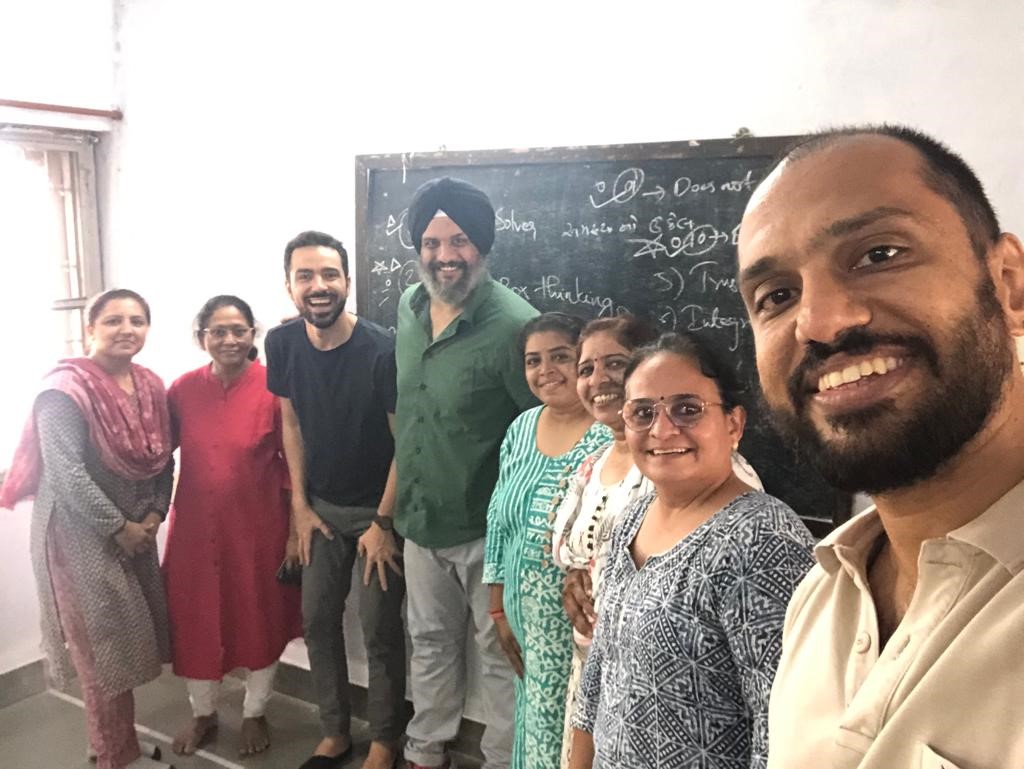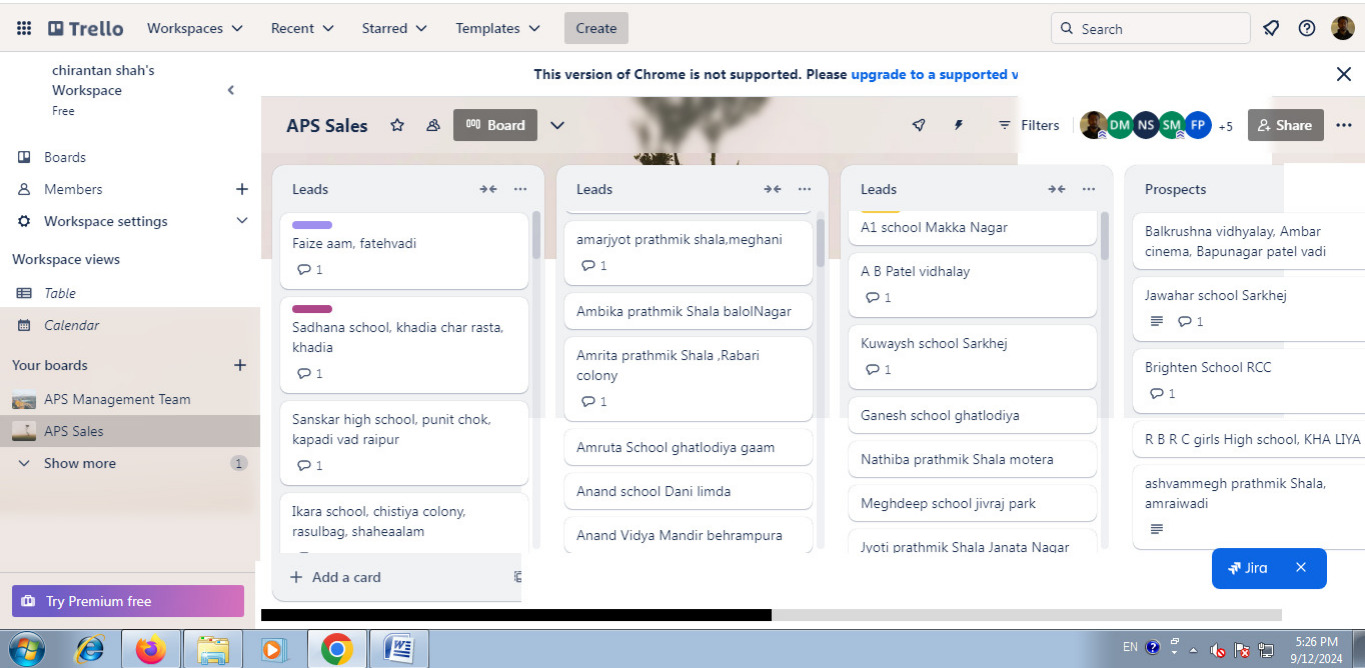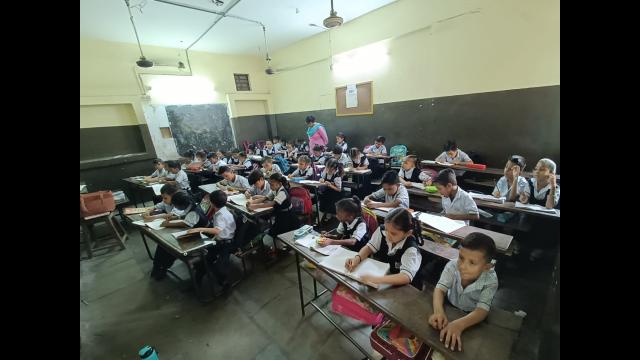The lack of an appropriate scale strategy can limit the impact and scalability of a promising education solution - it can restrict growth, discourage diversification of revenue sources and weaken financial sustainability.
This case study reflects the challenges and learnings of Gyan Shala, a nonprofit education organisation based in India, as they delivered their paid-for service to affordable private schools. In this blog, learn how Gyan Shala, with the support of the GSF Impact at Scale Labs, developed a new approach to strengthen their sales process and continue their path to impact at scale.
Gyan Shala’s Background
Since 2000, Gyan Shala has earned acclaim for developing and disseminating high-quality educational curricula for over 25000 children annually. The organisation does this through its community learning centres and at various points in time, through its government school support program in four states in India. Using the curriculum approach, Gyan Shala develops daily lesson plans they distribute to schools with worksheets for students. They support these with biannual conceptual training, monthly teacher guides, monthly training and in-class support for teachers. The model had been designed to ensure that all teachers (including community-hired teachers), regardless of educational background, training, or motivation, can help children achieve high learning outcomes. Evidence 1,2 shows that children learning through the Gyan Shala approach perform on par with students from some of the best schools in India.
Identifying the Problem and Opportunity
Nearly 50% of all students in India are enrolled in the 4.5 lakh privately managed schools across the country (U-DISE 2019). 70% of students in private schools pay less than Rs 1000 (<$12) a month, whereas 45.5% pass less than Rs 500 ($6), suggesting that majority of the sector is low-fee or affordable.
The National Independent School Alliance (NISA) estimates that there are over 400,000 private affordable schools serving students in India and the number of children attending affordable private schools is expected to reach an estimated 162 million by 2031.
Learning in private schools has stagnated over 10 years. Only 65% of Grade 5 children in private schools can read Grade 2 level paragraphs and only 40% can solve Grade 3 level division problems. The situation is worse in Gujarat private schools than rest of India, with less than 20% able to do Grade 3 level math problems and only 50% able to do Grade 2 level Reading exercises. (source: CSF - State of Sector Report on Private schools quoting ASER 2018 and 2019 reports)
With the Affordable Private Schools catering to the same low-income disadvantaged communities that Gyan Shala is committed to improving learning outcomes for, and the worrying state of learning outcomes in affordable private schools; Gyan Shala was keen on developing a scalable solution that would help improve learning outcomes in Affordable Private Schools.
While Gyan Shala had 20 years of experience in improving learning in Gyanshala Community Learning Program (GCLP), it had never worked in the private schooling space. Thus, the organisation was keen to expand their impact by scaling their support from government schools to affordable private schools in India. To accomplish this mission, the organisation must develop a sustainable business model, process and sales strategy that allows them to support APS, while charging low fees, and maintain the quality standards that underpin their reputation.

Gyan Shala's Challenge
Gyan Shala expanded into the APS sector in 2021. The organisation piloted their solution with 15 schools in 2022 and grew to almost 50 schools in 2023. However, compared to their experience in their community learning centres and support provided to government schools, private schools had a different target audience; the structure and hierarchy of command were different, the sales process was different (with various stakeholders expecting commissions), the decision-making process was different with varying involvement of principals, teachers, parents, students in the same. The desired outcomes were also different with teachers and principals often more focused on allaying parents' concerns about their child's worksheet being filled correctly (even if the same has been done by copying answers from the board, not resulting in any actual learning). Gyan Shala encountered multiple challenges in effectively engaging new schools, onboarding them, and retaining them.
This threatened their milestone of supporting 500 affordable private schools in 8 years.
To tackle this challenge, Gyan Shala joined the Impact at Scale Labs in 2022. The Labs supported them in developing a new theory of change to gain clarity about the APS sector and define their approach to scaling their impact in the sector. They followed this with a new financial model that was appropriate for serving affordable private schools and projected their breakeven points. To successfully attain the projections in their financial model, Gyan Shala needed a sales strategy that adhered to their core principles of affordability and excellence while ensuring traction in their APS journey. However, they faced competing providers in the APS market, many of whom already have established presence.
Unlike its community learning program, the APS program for Gyan Shala had to become self-sustaining within a few years as donors are reluctant to provide long-term funding for services provided to profit-making set-ups. However, given that most schools operate on thin margins, and the more established competition (who provided worksheets manufactured at a much larger scale and hence lower costs and did not incur costs of in-class coaching/training), Gyan Shala had to ensure that the solution was just about affordable for schools – after doing a dipstick Value Price Trade-Off exercise, they arrived at a subsidised price point of Rs 600 per student per year (< $8).
Several of these competitors also had large sales and marketing teams that made them more visible and credible.
For Gyan Shala to succeed in the APS sector, they needed a sales strategy that matched the challenge ahead. With support from the Impact at Scale Labs, the organisation embarked on the following:
STEP 1: Review of Existing Strategy:
Gyan Shala assessed their current sales strategy and identified critical gaps. For this assessment, senior management from the organisation engaged with trustees and principals who had shown interest, and liked the training, but did not sig up for the APS program. See highlights of this review below:
- The organisation had limited marketing initiatives, minimal social media presence, and insufficient brand visibility.
- They suffered poor product perception among teachers; who perceived Gyan Shala's material as extremely dense and difficult to implement. For example, the lack of standardised tools such as answer keys (which make the teachers' work easier but affect the child's quality of learning) contributed to their perception of lower quality.
- The absence of a dedicated sales team with the requisite training and experience to communicate well to allay the apprehensions of the schools hindered Gyan Shala's ability to effectively engage with potential clients. To manage costs, Gyan Shala enlisted their school supervisors to double up as sales members in the initial phase of the program. These supervisors provided training, customer support and sold to schools. None of these staff had a background or experience in sales and business development. Lead generation was limited to field visits. There were also no retention efforts of existing clients beyond operational visits to these schools. This eventually proved ineffective due to their skill and process gaps.
- Furthermore, the dual responsibility of sales and supervision, also affected quality of coaching/supervision provided to schools, which led to lower customer retention posing significant challenges to sustained growth.
To address the key challenges that emerged in the exercise conducted - Gyan Shala decided to match the existing market norms (such as providing answer keys for worksheets, test papers based only on existing questions in worksheets, etc.); with the objective of first bringing the teachers on-board with the Gyan Shala approach - through a higher frequency of in-class coaching (possible because of exclusive supervisors who would not double up as salesperson).
STEP 2: Market Research with Existing Customers:
Engaging directly with their existing customer base, Gyan Shala gained insights into their strengths and areas for improvement. Notably, customers expressed appreciation for Gyan Shala's comprehensive teacher training programs and mentorship initiatives, highlighting the organization's commitment to professional development. However, concerns were raised regarding the print quality of their lesson plans, including issues such as bad quality of a few images printed in workbooks (which emanated from a coordination issue between design team and printer regarding locking colours in designed workbooks) and delays in book deliveries. Gyan Shala began to attend to this urgently. Few of the measures undertaken to address these concerns included:
1) Training the team on align on a design system for developing workbooks for colour printing.
2) Putting in place an exclusive editor - who ensured that there were no typing mistakes, grammatical errors in any of the content designed.
3) Putting in place an exclusive graphic designer - who ensured desired text-image alignment/quality for each page.
4) Ensuring that paper quality (in terms of GSM) matched the industry standards of guides/exercise books from the best publishing houses.
STEP 3. Revised Sales Strategy and Process:
In response to these findings, Gyan Shala began redesigning their sales strategy and processes. They hinged their sales approach on three main aspects:
- Prioritization of customer needs and feedback to drive product refinement and service excellence; Steps to accomplish this included
- Understanding the customers through relationship building and conversation.
- Uncovering the customers’ pain points by asking qualifying questions that make the customer think about their needs.
- Proposing solutions that address these customer pain points.
- Getting final customer approval on product refinement and services provided.
The sales team was also trained on sales methodologies like the SPIN technique which encouraged the implementation of the process above.
- Investment in sales training and support to empower teams and enhance performance. This was predicated by having a dedicated sales team to new school acquisitions and separating the sales team from the program team. Gyan Shala conducted intensive training sessions focused on cultivating effective sales techniques and relationship-building skills. Emphasis was placed on understanding customer needs and tailoring solutions to address specific pain points, thereby fostering trust and rapport. Additionally, the sales team received guidance on negotiation strategies and contract finalization to facilitate successful deal closures.
- Embracing simple technology platforms to enhance lead management, communication efficiency and a data-driven culture in the sales team. Gyan Shala established a structured sales process, tracking lead generation to contract finalization, to streamline operations and improve efficiency. This involved developing a robust sales funnel aimed at attracting and engaging prospective clients. They complemented this with targeted marketing efforts, including the creation of compelling testimonials and brochures to enhance brand visibility.
STEP 4. Refining the Sales Process:
To augment sales efforts, Gyan Shala implemented the following

- A Trello board to track sales progress and facilitate seamless communication among team members.
- A mechanism to collate possible reasons for sales loss (lack of conversion) was also created. This allowed the sales lead to evaluate on a weekly basis identify areas that needed improvement (e.g. quality of sales pitch, pricing, sample training, teacher feedback on learning material (finding it overwhelming); thus, improving quality of feedback loops for individual school dissonance as also making improvements in program/service based on feedback.
- A database to leverage government and personal networks. Gyan Shala sought to expand their lead generation efforts, segmenting leads based on pertinent criteria to optimize targeting.
- Scheduled regular team meetings and individual sales visits to ensure accountability and foster a culture of collaboration and synergy.
- A dedicated WhatsApp group facilitated ongoing engagement with existing customers, promoting long-term relationships and customer loyalty, albeit only towards the end of the 2023-24 academic year. This is likely to help resolve challenges faced by existing customers faster in the 2024-25 cycle.
Conclusion:
Gyan Shala's APS program involved a shift from being a free social service provider to a non-profit selling a product-service package at a cost. A few takeaways from Gyan Shala’s experience include:
- The low fee private schooling market is very different from government and non-profit education spaces and requires a detailed understanding of stakeholder expectations. Detailed work on Theory of Change helped Gyan Shala understand this market far better.
- A dedicated sales team (with intensive training) allows focus and accountability of sales, also allowing the team to focus solely on improving sales skills. Part-time sales team may save costs in the short term, but in the long term affects sales conversion rates.
- Similarly, a dedicated supervision team is also allowing for better in-class coaching and faster alignment of new teachers to Gyan Shala approach.
- It is important to have effective feedback loops (both for failed sales - which helps identify challenges at salesperson level and program level) and for existing customers' concerns to be addressed immediately (to ensure higher retention).
- Successful scale in the affordable private schools sector requires astute sales mechanisms and dedicated sales support.
- Organisations must deliberately shape the perceptions of their products and services with their target audience when providing fee-paying products or services.
- Organisations should carefully track their sales funnel to manage retention and new acquisitions while building strong mechanisms to gain insights from their target audience.
- Insights gained from customers should be used to develop better product/service experiences to ensure customers continue to use their products/services.
Related Tool

